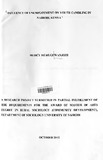| dc.description.abstract | The study was on the influence of unemployment on youth gambling in Nairobi, Kenya and the objectives of the study were to; explore the extent to which the youth engage in gambling, determine whether youth unemployment contributes to gambling, establish whether the youth engage in gambling as a source of income and to determine the social-economic characteristics of youth engaging in gambling. The design of the study was a descriptive survey and was undertaken in the casinos in Nairobi County. The study targeted two groups of respondents; 60 respondents who were involved in gambling and 60 respondents who never gambled. Data was collected through a questionnaire and was analyzed using both descriptive statistics and relationship statistics. The type of descriptive statistics used was frequency distribution tables, while the relationship statistics type used was the Chi-square. The researcher formulated a hypothesis and tested it by use of both null hypothesis and alternative hypothesis. The null hypothesis (HO) was, Youth unemployment does not contribute to youth gambling while the alternative hypothesis (HI) was Youth unemployment contributes to youth gambling.
The study revealed that majority of the respondents visited the casinos twice per week which depict that youths deeply involved in gambling as over 70% of them visited casinos 2-3 times per week. They engage in gambling to try their luck and win money, thus the majority of the youths engage in gambling to generate income. Most of the respondents involved in gambling had been gambling for 1-5 years and that they went to the casinos both during daytime and at night which depicts that the youths had been gambling for many years and that gambling was part of their lifestyle. The study found out that most youth were involved in gambling, however youth unemployment had no influence to their gambling, hence the null hypothesis was accepted and the alternative hypothesis rejected, meaning that there are other factors that contribute to gambling by the youth. The study recommends that the government, non-governmental organizations and other stakeholders should come up with policies and strategies to govern gambling business in Kenya to protect the youths from engaging into gambling prematurely and also to sensitize the youths on the effect of gambling and its negative effects. The researcher recommends other studies should be carried on, factors contributing to youth gambling in Kenya and also on the social and economic impact of gaming in Kenya. | en_US |

